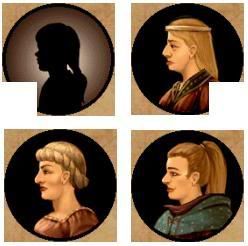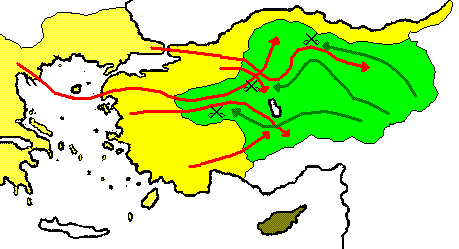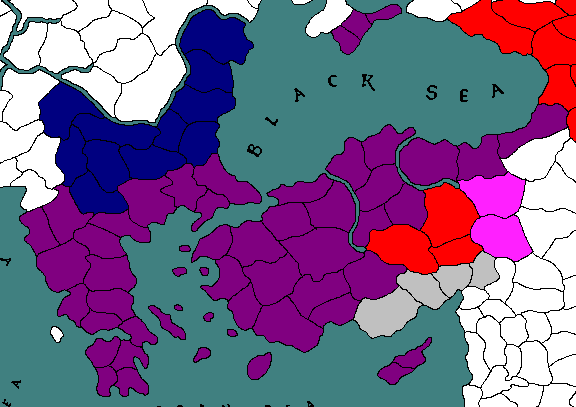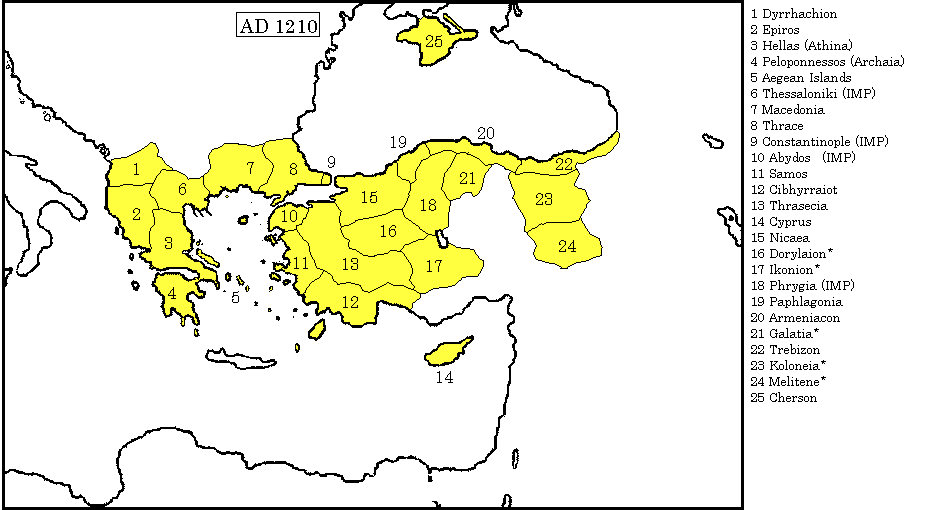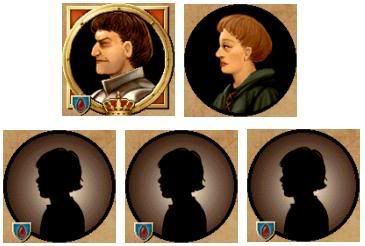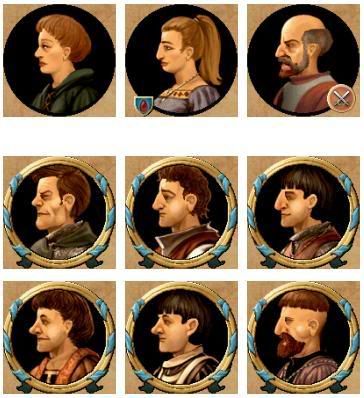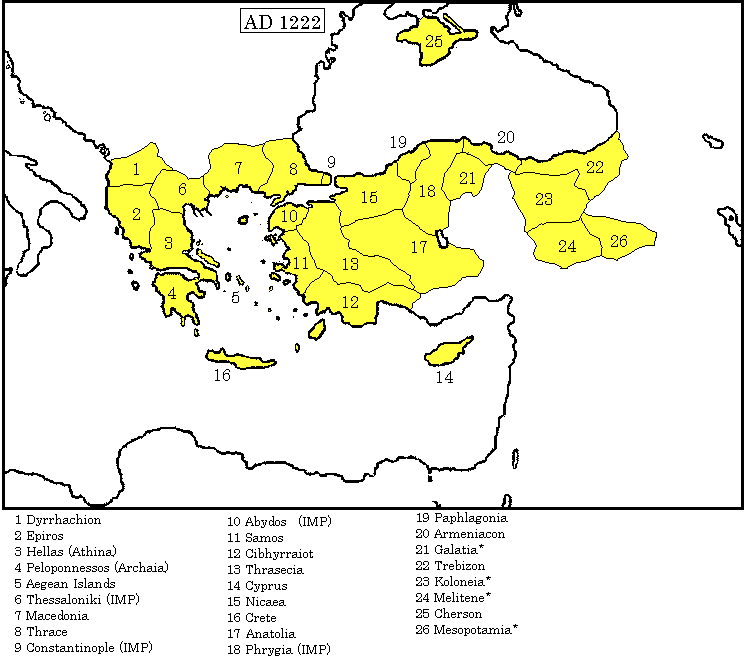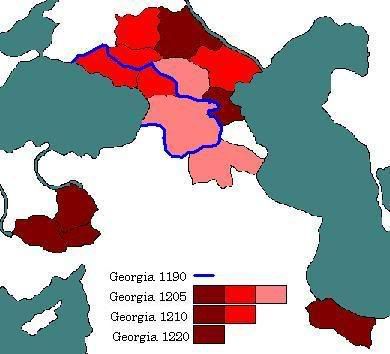Regretfully for Kalina’s mother, I did not see her daughter before the next lecture. That Thursday evening I was actually on time for once, and I found myself a seat on one of the back rows. Slowly the lecture hall began filling up with students. Some worn scarves and gloves as they came in. Although it was early March, it had become quite cold the past few days and the weather forecasts had all predicted snow in the weekend. As much as I liked snow, I had also learned not to rely too much on the weather forecasts in Constantinople in winter. It changed every single day. Professor Doxiadus was only a minute late as he came in, accompanied by the black pantsuit women who now actually wore a grey pantsuit. I guess I should start calling her pantsuit woman now. She watched the student like an eagle, as if she expected us to start rioting if she looked at the floor or the door for a second. Then Kalina came in, and the pantsuit woman followed her instead, as she walked to my row. “Hey, mind if I come sitting next to you?”
she asked. Her face was red, she probably had been outside. Her long black hair had been tied up in a pony tail, although some strains of hair still stuck out. Her smile and her demeanor made me wonder if she had forgotten about last week. “Oh, of course not!”
I quickly said as I noticed I had been staring at her. She sat down, but Doxiadus began before she could reply. An image appeared on the screen behind the professor, showing two familiar faces and three portraits.
“Welcome everybody, I hope nobody has had their nose or ears frozen off yet. Remember if you’re outside and you’re really cold, you should just start smoking.”
There was some laughing, apparently mostly from seniors. I noticed Kalina chuckling too.
“It wasn’t that funny, Alexios! Besides, I know what you usually smoke, son.”
Alexios and his friends laughed. They were on one of the front rows today.
“You betcha, sir! It always keeps me warm.”
“No son, it just numbs your senses… anyway… today we’re going to cover an interesting period in Imperial history, a period that is known both as the Era of the Child Emperors and the Era of the Iron Council. It is also known by Latin historian as the First Interregnum. And as I like that best, I’m going to use that one. Now, as you know the rule of the Kantakouzenoi dynasty thus far has not been considered a particularly strong reign, but also one that by pure chance gave the Empire the vitality it had lacked for decades. It seems that sudden people and events had saved the young dynasty from falling, and at the start of our story – in 1210 – it had been in power for 23 years. The reign of Mikhail the Unfortunate had seen a civil war against most strategoi and the start of the reconquest of central Anatolia as Mikhail’s final deed on the mortal plane. The reign of his adopted brother Demetrios had seen the rise of the strategoi as de facto powers behind the Empire, and only because of his marriage with the strong Prokopios Synadenos he had not been removed from power completely. Last week I also told that Prokopios would give Demetrios two healthy heirs – Nikophoros and Anthemios – and in fact a third son – Basileios – would be born in 1210. So there you have the picture behind me; father, mother and three young boys who are all that is standing for the Kantakouzenos dynasty. The boys’ portraits are still blank, as they were simply too young to have their portrait taken at the time. Apart from that, it almost idyllic. And as usual in Imperial history, such a state never stays that way too long.”
“Trouble starts in the autumn of 1211, when the strategos of Trebizon rebels against the Emperor. If you paid attention last lectures, you know that Trebizon was one of the few themata that had not yet rebelled against the Kantakouzenoi yet. And it so happened that the strategos at the time was one of the Komnenoi, a young man named Alexios who despite his famous depressive spells and suicide attempt was known as a very able administrator. It is never really understood why he rose up now, nor is it known why Demetrios had insisted on leading the Imperial army against the rebellious strategos himself. But there he was, in the middle of winter, riding along the Pontic coast towards Trebizon. In the first battle against Komnenos, Emperor Demetrios already fell off his horse and broke his left arm and several ribs. Although heavily wounded, the Emperor won the battle and pressed on against the city of Trebizon. But then, as Komnenos attacked the Emperor’s positions in order to lift the siege on his city, Demetrios was struck in the chest by an arrow. He died instantly, and joined his brother in the line of Kantekouzenoi emperors who died too young in battle.”
“Unlike his brother, Demetrios had three healthy – yet very young – heirs. A week after he had been killed, and was on his way to be buried in Constantinople, his oldest son Nikophoros would be crowned Emperor Nikophoros IV Kantakouzenos. The boy was only four years old at the time, and thus was far too young to rule. If this is the case, it is usually a procedure to have the high nobles elect a regency council which would rule in the infant’s name. This time however, there would be two regency councils! That’s right. Two groups of people would for the next decade and a half feud for the regency powers.”
Behind the screen, no less than nine portraits appeared.
“Here are the ladies and gentlemen who will rule the Emperor for the next few years. The three people above are the official regency council, who had been appointed to look over Demetrios’ sons and who nominally had the support of the nobles of the strategoi. The first portrait you should surely recognize by now, for it is Prokopios Synadenos, wife of the late Emperor Demetrios I Kantakouzenos and mother to his sons Nikophoros, Anthemios and Basileios. Her title of Queen-Regent would officially as the most powerful person in the Empire, although of course the truth is more complicated than that. Second is Aikatenina Kantakounos, nobody else but the only surviving child of Mikhail the Unfortunate. She was only 15 when her uncle was killed, but being one of the few pure Kantakouzenoi in Constantinople, as well as her wits and intelligence got her a seat next to her aunt. Thirdly is Mavros Meschos, the Megas Domestikos of the Imperial army. The Megas Domestikos acted as a Grand Marshal did in a royal Latin army, as chief commander, and thus technically stood above the different strategoi. This hierarchy was quickly changing now, of course, so Meschos could be considered effective commander of the armies fielded from the Imperial-held lands only. All in all, although assigned the de facto government of Romanion, the regency council was not the most powerful body in the Empire.”
“This honor goes to the six men below the official regents, the six most powerful strategoi. They were officially called the Council of Nicomedia, but were – and are – best known as the Iron Council. These strategoi had had the greatest stake in the Imperial army and politics during Demetrios’ reign, and had sought to increase their power even further. The death of the Emperor, and the fact his heirs were very young, gave them a lot of extra space as the office of Emperor – and the aligned offices like Megas Domestikos – would quickly loose ground. It was therefore in the best interest in keeping the official regency council and the child emperors in check, and preventing them from regaining any of the power the Imperial office had lost in the past decade. If this meant plotting against the child emperors and infiltrating and bribing their court, or even committing infanticide, so be it. In 1212, the Iron Council was composed of the men on the screen. They were… Andreas Petraliphas of Hellas, Damianos Choumnos of Samos, Ioannas Laskaris of Nicaea, Eleutheros Batatzes of Thrace, Romanos Panaretos of Macedonia – who was also an archbishop in addition to a strategos – and Alexios Paleiologos Komnenos of Peloponessos.”
Some hands went up.
“Now, I know what you’re going to ask,” Professor Doxiadus said laughing. “No, you don’t need to remember those names. Just the themata they rule; Hellas, Samos, Nicaea, Thrace, Macedonia and Peloponessos.”
The hands went down as fast as they had went up.
“Now, we’re going to cover the Iron Council further at the Tuesday’s workshop, because the role of the Iron Council will not be played out at the end of this lecture, or even this century. For quite along time it will be active, although over time it will transform into what can we considered as an eastern version of the medieval parliaments in Latin countries. At this point they are just a collection of power hungry military men.”
“Before we’re going to take a coffee break, I’m going to cover the glorious one and a half year reign of Nikophoros IV. Now, it could be said that young Nikophoros didn’t have a lot of friends. An in fact, his reign was also the period the Iron Council had the biggest direct power over the regency council and the Imperial Throne. The only positive event in this period – the return of Crete to the Empire – is largely due to the diplomatic work of the strategos of Peloponessos – as one of the Komnenoi – in persuading his Cretan cousin in joining his party. The reign of Nikophoros is mostly known for its three assassination attempts on the young boy. The first one, in December 1212, occurred when the Emperor and a few of his retainers were attacked by a masked man on their way to the Hagia Sophia for prayer. The assailant had managed to escape, and could not be found even after the entire palace district had been closed off and searched. The second attack – in April of the next year - was more carefully executed, when the assassin slipped into Nikophoros’ bedchambers when the young Emperor was asleep. He had apparently not considered that the Emperor would be guarded by his bed by some of his caretakers. The assassin could be overpowered by to guards, but managed to flee through the open window. But then in September 1213, Nikophoros suddenly dropped dead during dinner. As his taster was found dead after that, he is most likely poisoned. The murder was never really solved. The prime suspect was the Italian spymaster Artemio Alermano, who was believed to have ties with the Iron Council, although this could never been proven. He would eventually be blinded, but would remain a member of the Imperial court and spent most of his remaining days with long episodes of depression. With Nikophoros killed, his brother Anthemios would be crowned Emperor. But before we cover this second child emperor and his brother, it’s time for coffee!”
Professor Doxiadus and the pantsuit woman walked outside before any of the students. Kalina also stood up. “Want to get some coffee too?” “Sure,”
I said and I followed her down and out of the lecture hall. She insisted to buy coffee this time, so I waited for her to return with two paper cups of steaming hot liquid goodness. “Hey, listen, I’m sorry about last week. It was rude of me to start about your grandfather,”
she said as she gave me my coffee. I looked at her. “No, it’s really okay. I mean, I understand if you’re curious.”
Kalina laughed. “Yeah, I’m just too curious for my own good sometimes. But errr… let’s just not talk about your grandfather again, okay? Unless you want so yourself.”
I knew it was selfish to accept that offer, but it somehow also made me feel good. Suddenly Kalina turned to the door to the lecture hall as the pantsuit woman walked to it. She stared at Kalina angrily, and when I looked at Kalina I also saw fury in her green eyes, who looked both beautiful and terrifying at the same time. Then the woman was gone, and Kalina smiled at me again. “Who… what was that?”
I asked flabbergasted. “Well… she’s a friend of my mother.” “Oh... Oh yeah, that is right, professor Doxiadus asked me to ask you call your mother Tuesday. What was that about?”
Kalina became a little pale, and she looked at the ground. “My mom and I don’t get along so well, recently. She… she makes all kind of demands like I’m a servant of hers, instead of her 20-year old daughter who lived hundreds of kilometers away.”
I sighed. “Must be that believe by parents that because they raised and fed you, they have the right to command you around the rest of your life.”
Kalina shook her head, while she slowly looked up to me. “No, my mother didn’t do a lot of parenting. My father was always there, but my mom… she was always working. I don’t really feel like I owe her anything. Even if she gives me all this ‘I’m still the one who gave birth’ crap. And when I do help her, it’s never enough.” “She sounds like someone who would be happy with just trying your best,”
I said insightfully. She shook her head, and focused her full attention to her cup of coffee. What was up with this girl and her mother? And mostly, why did I have the feeling this somehow involved me? The way the pantsuit had looked at Kalina, I remember her looking at me too at the first lecture. Perhaps I should have a talk with this woman, just to know who she really was. “Listen,”
I said, “If you want, we could add your mother to the list of tabooed subjects too.”
Kalina finally smiled. “That would be nice, Alex. I’m sorry to have dumped this crap on your plate.”
I shrugged. “It was Doxiadus… oh…”
I pointed to the door, where the pantsuit woman stood waiting for us. Apparently we were the only students left in the corridor. “Hurry up you two,”
the woman droned without looking at either one of us. We quickly got inside and walked up to our row. Behind us, professor Doxiadus said “Ah, good you two could join us again,”
but although some students laughed, the professor sounded very genuine.
“So, we left with the 6-year old Emperor Nikophoros IV Kantakouzenos being poisoned. While the investigation to the murder was still underway, his brother Anthemios would be crowned as the new Emperor. Like his predecessor, he was only four years old when he was crowned, so no great deeds could be expected from this fresh new Emperor. It was widely believed in both the Imperial court as well as the city of Constantinople that Nikophoros had been killed to give the regency council two more years of reign. Although the commoners wouldn’t see the difference between the regency council or the Iron Council, Queen-Regent Prokopios increased security measures around her two sons and attempted to assemble a small group of trusted caretakers who would be allowed to be alone with the boys. Needless to say, they also weren’t allowed outside the palace. This too would give the impression to the people that the Queen-Regent wanted to draw power to herself by keeping her sons prisoner. Of course, the truth lies somewhere in the middle.”
Two new portraits appeared on the screen.
“The early reign of Anthemios was marked by new rebellions in the Pontic themata. Matthaios Axuches of Armeniacon had rose up against the Imperial throne in the latter days of his brother’s reign, and he when he defeated his revolt would be succeeded by that of Alexios Komnenos of Trebizon. Yes, the same strategos who caused the death of Emperor Demetrios two years earlier. He was a scornful and often-depressed man, apparently, who took another chance at independence. It should be said, however, that these revolts were aimed at the Iron Council as much as the Imperial office. After all, Axuches and Komnenos were two strategoi who had been left outside the Iron Council even though their armies and treasury could compete with that of the Iron Council strategoi. This time Megas Domestikos
Mavros Meschos was merciless as he led the Imperial armies along the Pontic coast though. Both strategoi would be stripped of lands, titles and office and would be exiled. Alexios Komnenos had the best luck in this light, as he had a fairly large lordship on a personal title in Derbent, along the Caspian coast. He and the Trebizon Komnenoi would rule this land for some time.”
“All in all, the reign of Anthemios was a prosperous time, in which the Imperial economy as a whole prospered. During this time Phrygia would also be colonized by Greeks from Constantinople and Sinope, who would quickly outnumber the Turks in that area. The Archontia of Theodosiopolis and Mesopotamia would be reclaimed from the Sultanate of Erzerûm by the new strategoi of Trebizon and Armeniacon. But at the same time the fight between the regency council and the Iron Council would begin to take its toll, when in April 1216 the strategoi demanded the institution of elective succession laws. The proposal had supposable meant to place a responsible adult on the throne rather than a six-year old. And although the Queen-Regent has managed to block this new laws, the whole issue caused quite a falling out with her niece Aikatenina and in effect with the Megas Domestikos, for he was married with her. This issue lingered on for two years, while Aikatenina Kantakouzenos established ties with the strategoi of the Iron Council and in the process bringing her husband to his rightful place. But this also meant the integrity of the regency council had now been compromised by having two of its three members openly align with the Iron Council, and Queen-Regent Prokopios thoroughly discredited. When Anthemios was assassinated in June 1218 and Aikatenina was the prime suspect, she would not be prosecuted. It was clear to everybody that she has acted on behalf on the Iron Council now, though, and the general public began to realize that the Iron Council might not have the well-being of the Empire in mind when killing children. So slowly, the general opinion within Constantinople began to sway in favor of the Queen-Regent.”
“After the murder of Anthemios, Demetrios youngest son Basileios would be crowned as Basileios III Kantakouzenos, and he would be the last of the three child emperors. Basileios was seven at the time, and he already showed great potential. The Queen-Regent was even more protective to her last son – as is understandable – and threw her niece out of the regency council. Although Prokopios could not afford to offend the Megas Domestikos too much, he too was no longer allowed at the young Emperor’s quarters. With her claiming the sole regency position, and having lost the support of the people of Constantinople, the Iron Council had actually suffered a
defeat with the death of Anthemios. As a result, the pieces on the chess board were reset and both sides began to find new allegiances again. As the Iron Council had managed to get Aikatenina Kantakouzenos and Megas Domestikos Mavros Meschos on their side, Queen-Regent Prokopios would find unlikely allies in the house of Angeloi – in the form of the mater familias Theodora Angelos - and the King of Sicily, Jacopino. As a result of this uneasy peace, the Empire once again flourished. In fact, those who are familiar with the history of Thessaloniki know that this period – around 1220 – is the time both the Imperial Academy and the renewed Hagios Demetrios are completed, and the second quarter of the thirteenth century would be one of the city’s golden ages.”
“We’ll end this lecture at Basileios’ 12th birthday, on August 28, 1222, for that would be the day he would first begin to take some duties over from his mother. This day is therefore by some regarded at the start of Basileios III’s reign. But before I let you go, I have to show you
two more maps. That is right, two.”
The familiar white and yellow themata map appeared on the screen.
“The first one is, of course, the themata map as of 1222. As you see, not much has changed in the past twelve years, apart from some conquests in the east and some changed in the thema of Armeniacon after the last revolt, the rejoined thema of Crete and the establishment of the thema of Anatolia. I haven’t printed this map, as I believe it wasn’t really much of a change from the last, but I will upload it on the network tonight. And now, a desert for you…”
Another map appeared on the screen, this time in different shades of red. It took me a second to recognize where this was.
“As I said in the first lecture, the Kingdom of Georgia had experienced a golden age under the reign of Queen Thamar. As you see on the map, the kingdom nearly tripled in size until 1205, and it contained the entire Kaukasus region. But eventually the Khwarezmian Shahs became annoyed by the continuous Georgian raids into the northwest of their realm, and sent out their grand army from Urchengh to punish Queen Thamar and neutralise the Georgians. Although Georgia was well capable of taking on their smaller neighbours, the vast Khwarezm Empire was simply too much for them, and after a number of expeditions the entire kingdom had been dismantled into a handful of scattered holdings. Why is this important to our story? Well, for one, the Roman Empire had been Georgia’s only chance for survival, but opted not to – due to higher interest in central Anatolia and the internal conflicts – and this had set a lot of bad feelings between the two. Secondly, Georgia’s heartland now lie in central Anatolia, and thus in the way of the Roman Empire. The results will be discussed next week…”
People started to pack their bags at the mention of ‘next week’. Over the ruckus, professor Doxiadus reminded us that next week’s workshop would go on, and it would cover the Iron Council somewhat deeper. When I had my bag packed, both Doxiadus and the pantsuit woman were already gone. Kalina was already standing, but she apparently waited for me. We both walked out of the lecture hall. “Say, you want to get a coffee?”
I asked as we got clear of the crowd. “Oh, I got a lot of homework due for tomorrow, Alex…”
Kalina said remorseful, “But… do you have anything for Saturday?”
I shook my head. I already visited my parents last weekend. No need to get then too accustomed to me emptying their refrigerator. “We could get some coffee downtown then, if you’d like,”
she said with a smile. “Sounds great,”
I replied, not yet aware of what it had meant. “Give me your cell phone number, then I’ll text you tomorrow for a place and time, okay?”
We swapped phone numbers, and then we parted. It was until I almost reached my apartment building that I realised I had an actual date for the weekend. I felt my heart racing. Bloody hell, I might as well ask my flatmates for some advice. Guess there’s a first for everything…



